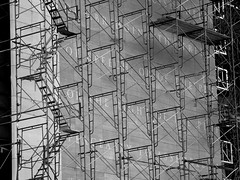What is the First Amendment?
By Kristopher A. Nelson
in
December 2011
500 words / 3 min.
Tweet
Share
Congress shall make no law respecting an establishment of religion, or prohibiting the free exercise thereof; or abridging the freedom of speech, or of the press; or the right of the people peaceably to assemble, and to petition the Government for a redress of grievances.
Please note that this post is from 2011. Evaluate with care and in light of later events.

The First Amendment to the United States Constitution is first of ten Amendments that constitute the so-called “Bill of Rights.” It originally bound only the federal government–not state governments–but after the Civil War, it slowly began to be “incorporated” through the Fourteenth Amendment to apply to the states as well. It reads as follows:
Congress shall make no law respecting an establishment of religion, or prohibiting the free exercise thereof; or abridging the freedom of speech, or of the press; or the right of the people peaceably to assemble, and to petition the Government for a redress of grievances.
It consists of multiple parts:
- The Establishment Clause, which forbids government support of any particular religion. This is also considered to be the foundation for the “separation of church and state”: the requirement that religious and governmental matters not overlap. It is not an absolute prohibition, and many conservatives see it not as requiring the removal of God or prayer from public life, but rather as a prohibition on establishing and promoting one specific state church.
- The Free Exercise Clause, which generally forbids governmental interference in religious practices absent a “compelling state interest.”
- Freedom of Speech, which generally–although not absolutely–protects the right to speak even if it offends others. The classic example of an acceptable limitation is that one may be punished for the harm that results from yelling, “Fire!” in a crowded theater. The protection is against government restrictions on speech, not private restrictions, although private restrictions that invoke state power (as with a libel action) are subject to First Amendment scrutiny as well.
- Freedom of the Press, a right very related to the previous one, but focused more on publications than individuals. It is also subject to limitation (libel, for example). Regulation of broadcast media is not generally a violation of press freedoms, although content-based regulations are usually not allowable.
- The Freedom of Assembly and to Petition, although directly stated, have rarely been ruled on by the Supreme Court. The general idea is that–subject to reasonable time, place, and manner requirements–citizens are allowed to gather and ask for a redress of grievances.
- Freedom of Association is a right implied by the First Amendment, although not directly stated. Thus, political parties may exclude those of another party from voting in their primaries, and the Boy Scouts may exclude openly gay scoutmasters.
